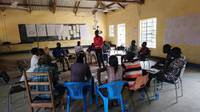
The initiative’s long-term goal is:
Education systems prioritise, promote, and integrate WCD approaches and pedagogy that respond to the needs of vulnerable children during and post COVID-19.
The WCD approach sees education as a holistic, developmental process that encompasses all aspects of the child’s development – physical, social, emotional and academic – with the active engagement and support of the community. The approach recognises that all children, particularly those who have experienced tremendous hardship, need to acquire information, skills, experience and fundamental values that will enable them to participate as productive and ethical citizens in their communities and throughout the world.
On the basis of their experiences working with different stakeholders, five grantees were identified to work on the initiative: 1) Kenya Conference of Catholic Bishops (KCCB); 2) Jaslika Consulting; 3) Akili Network; 4) Dalberg; and 5) JET Education Services.
The work focused on a) identifying and implementing the most effective models for delivering education to vulnerable children; and b) ensuring that the knowledge created is shared among the various partners to facilitate capacity building, sustainability and the building of networks that drive systems thinking in the creation of local solutions.